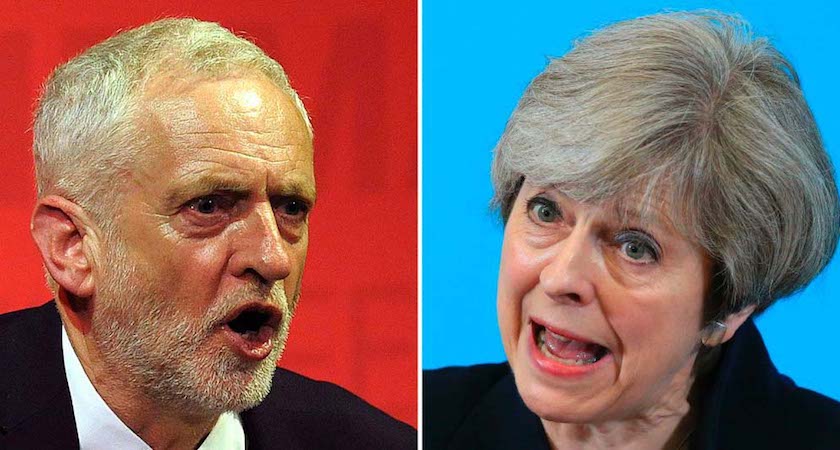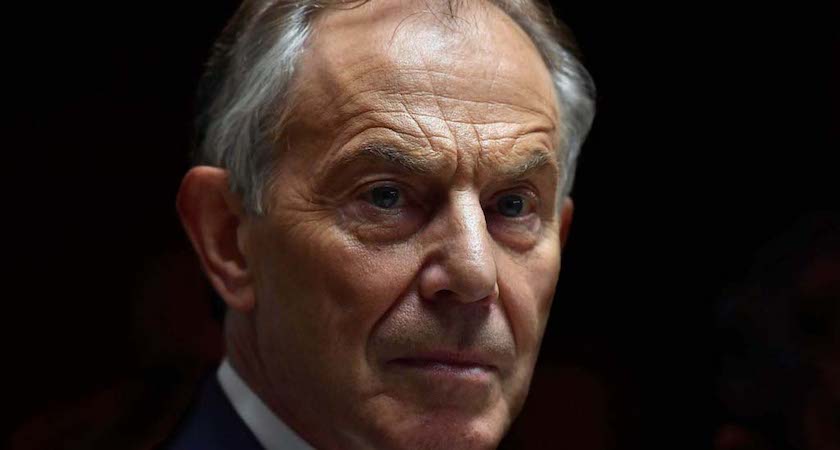As Britain goes to the polls on June 8, THOMAS GILMARTIN questions whether anyone cares about Ireland, post-Brexit
THE Irish in Britain are now diverse in outlook and political leanings, and integrate a lot more easily than in my parents’ time – but perhaps there needs to be a means of amplifying our electoral clout on those few issues of such great consequence that a united voice is possible (such as on the topic of what a hard Brexit will do to Ireland).
Barring a miracle, the British General Election is a foregone conclusion – Theresa May will be returned to power with a significantly increased majority.
Jeremy Corbyn was a friend to the Irish community in Britain at a time when precious few were, and is a palpably decent man.
What he isn’t is a leader who inspires people beyond his own core support – including the Blairite and centrist wings in his own parliamentary party.
The Tories are repeating May’s “strong and stable” mantra like a broken record, and contrasting that with what they describe as Corbyn’s incompetence. It’s transparent stuff, but effective.
The election should not be about personalities – the UK is not a presidential system – but the reality is that Theresa May is winning over the type of Labour voters who switched to UKIP or voted to Leave in the Brexit referendum, even in Labour’s former northern English and Scottish fortresses.
May’s victory will mean that a ‘hard Brexit’ is inevitable – and the consequences for Ireland are frightening.
For all the talk of common purpose in avoiding a hard border, nobody seems to have a clue how to prevent one.
A land border between a state inside the single market and one outside it surely requires permanent customs posts – no computerised technology can physically search a vehicle for contraband goods.
There seems to be goodwill on all sides, and perhaps something extraordinary might be conceived to square the circle, but it seems implausible.
Ireland is also a victim of geography in the Brexit process. European goods and services tend to come via Britain. The same applies to critical energy supplies, particularly gas.
Post-hard Brexit, the Republic will be reliant upon a state outside the single market for many of its imports.
There might need to be a reorientation of importation practices and infrastructure, or else difficult-to-police arrangements allowing traffic from the continent to cross Britain without tariffs being imposed.
Either way, it is quite an imposition.
 Labour Party leader Jeremy Corbyn and Britain's Prime Minister Theresa May (Pictures: Andy Buchanan, Lindsey Parnaby/AFP/Getty Images)
Labour Party leader Jeremy Corbyn and Britain's Prime Minister Theresa May (Pictures: Andy Buchanan, Lindsey Parnaby/AFP/Getty Images)This is even before we factor in the consequences for trade in losing unfettered access to Ireland’s main market, and the economic hit Ireland will suffer (with scant compensation in the form of post-Brexit relocations from London by major banks and financial institutions).
Yet the effects of the outcome of this election upon Ireland have barely merited a murmur from the main political parties. Neither have they troubled the consciousness of the overwhelming majority of the British electorate.
Think about that – an economically and politically catastrophic imposition upon one state by the electorate of another state, and yet virtually nobody in the latter could care less.
Sure, Tony Blair and Sir John Major, among others involvedin the peace porcess over the years, have been at pains to poiont out the potential difficulties for that process - but there has barely been a peep of acknowledgment from current mainstream politicians.
When it is ever raised, the likes of Theresa May offer platitudes about 'nobody wanting a return to the borders of the past', as if dismissing the problem makes it disappear.
For the politicians and electorate of one state to be this blase about such a dire threat to the well-being of another state is extraordinary.
If only the Irish in Britain had the electoral clout to make this a central election theme, (and indeed the entire Brexit negotiation process), the kind of influence that Irish American votes once had in US politics, with politicians of all stripes appeasing their concerns.
Alas, we don’t. There are good reasons for that, of course – the newer generations arriving from Ireland to work in Britain are a demographically and politically more diverse group than my parents’ generation were in the 1950s.
To speak of an 'Irish community' in Britain is itself open to question – newer arrivals integrate far better than those in previous decades, and the disappearance of racist presumptions and regular bombings means that the challenges which often led us to ghettoise ourselves are gone.
In many ways, this phenomenon is no bad thing.
Second-generation Irish people no longer feel the Irish aspect to their identity to be a politically-charged albatross around their necks, confused by the apparently conflicting sides to it.
Complete integration into the host community is now normal by the second or third generation.
However, this lack of ‘apartness’ means that specifically Irish concerns are not high on the agenda when heading to the polling booths.
There cannot be an Irish voice at most elections because there is no Irish voice – there are voices, plural.
Yet some issues transcend – and the turmoil being imposed upon Ireland by a hard Brexit is one of them.
Irish people in Britain, whatever their politics or generation, will largely agree that this problem is not being given the attention it demands.
That it barely troubles the media or prospective MPs is a scandal. That we, the Irish in Britain, cannot organise a coherent bloc voice to speak out against this travesty is a wasted opportunity at a critical moment in history for both countries.
This is not an argument for self-appointed “community spokespeople” to presume to know and articulate the thoughts of Irish people in Britain on any given topic (which, to my memory, rarely involved anybody I knew being consulted).
Rather it is a question to be floated for consideration – is there a means for us to coherently flex our electoral muscle on issues of profound importance to Ireland?
For it is surely a travesty that we are letting this critical election pass without acknowledgment of the havoc that is about to be wreaked upon Ireland.
Thomas Gilmartin is a second generation Irish writer living in London, who has lived in both Britain and Ireland. He specialises in current affairs, law, and international relations.


